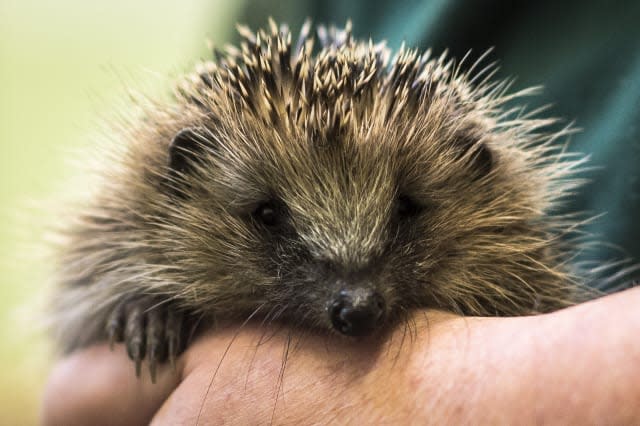Hedgehogs disappear from British gardens

Britain's hedgehog population is decreasing so rapidly that they are being driven towards extinction, a wildlife survey has confirmed.
While hedgehogs were seen in two thirds of gardens (65 per cent) at least once in the course of the year, they were spotted regularly in less than a third of gardens (28 per cent) - and they were not seen at all in 20 per cent of back yards, the RSPB survey found.
People were more likely to see a non-native grey squirrel than native hedgehogs, with squirrels spotted in almost three quarters of gardens (74 per cent) at least monthly throughout the year, according to information from hundreds of thousands of people.
For the second year running, the RSPB asked people taking part in its annual Big Garden Birdwatch to tell them about the other wildlife they see in their garden through the year, with householders supplying information about 294,550 gardens.
Grey squirrels were the most commonly spotted wildlife but their red squirrel cousins, which have been lost from large parts of the country due to habitat loss and a virus carried by the greys that is fatal to the native reds, were virtually unseen in UK gardens.
But in Scotland, where the majority of the UK's remaining red squirrel population is found, they were spotted scampering around regularly during the year in six out of 10 gardens, the RSPB said.
This year, participants were also asked to look out for slow worms and grass snakes, with slow worms seen in just eight per cent of gardens throughout the year, and two per cent of households regularly seeing grass snakes.
Half of the families taking part in the survey had never seen slow worms in their garden, and grass snakes had never been spotted in six out of 10 backyards. Both are secretive reptiles which can be found in compost heaps or near water sources.
Daniel Hayhow, RSPB conservation scientist, said: "Despite remaining widespread in many areas of the UK, important habitats for slow worms and grass snakes have been lost.
"As gardens become tidier, reptile homes have been lost, leaving a shortage of habitats in which to live and breed. Piles of logs, compost heaps and ponds provide ideal warm, sheltered environments for these species to breed, find food and to hibernate.
He also said the survey highlighted how important gardens were for a range of wildlife, much of which was in desperate need of help.
"By providing a shelter and a safe place to make a home, gardens provide an invaluable resource which are a key element in helping to save nature, perhaps even playing a pivotal role in reversing some declines."
Although hedgehogs were spotting in many gardens, the species is one of those in decline, with numbers thought to have dropped by 30 per cent since 2003 to less than a million in the UK - down from estimated populations of 36 million in the 1950s.
Henry Johnson, hedgehog officer for the People's Trust for Endangered Species, urged people to take steps in their garden to help hedgehogs find food and shelter.
He said: "Spotting animals is just the start. For more people to see hedgehogs in the future, we need more holes in fences, joining up gardens, and more insect-friendly gardening."
Related articles
Britain's best gardens to visit this Spring
Where to see bluebells right now





